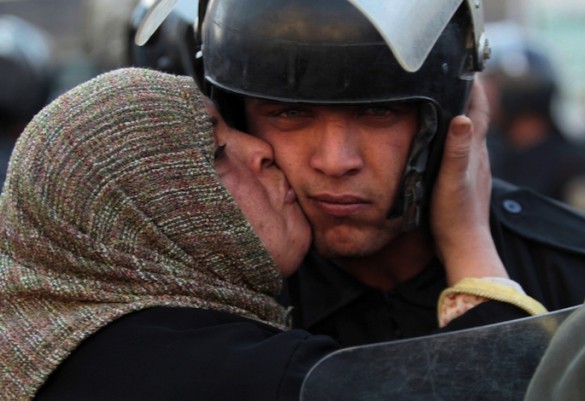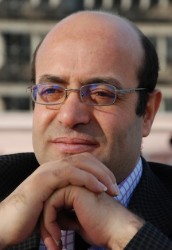Vanderbilt University brings together international journalists, scholars and artists in a five-part series of events exploring the Arab Spring

In December 2010, a Tunisian street vendor set himself on fire to protest harsh social and political conditions in the country. His act set off a wave of protests across the Arab world. From Tunisia to Egypt, Libya, Jordan, Yemen, Algeria, Syria and Bahrain, citizens joined together to demand social justice and individual rights in what would become known as the “Arab Spring.”
Vanderbilt University is bringing together an international journalist, scholars and artists for a five-part series of events, “Voices of the Revolution: The Arab Spring,” starting Friday, March 23, that will provide in-depth and wide-ranging perspectives on these unfolding events in the Middle East.
A little more than a year after the first “Arab Spring” protests began, longtime leaders have stepped down or been ousted from power. Some of the topics to be explored during the series include whether the so-called “Arab Spring” brought revolutionary change to the region, and if the protest movements in the Arab world have inspired protests in other regions of the globe.
Vanderbilt’s Office of the Dean of Students and International Student and Scholar Services are organizers of the series, with support from Vanderbilt’s departments of Jewish Studies, English, History, Political Science and Theatre, The Center for the Study of Democratic Institutions, the International Lens Film Series, The Martha Rivers Ingram Commons, the Middle Eastern Student Association, the Max Kade Center for European and German Studies, Beta Chi Theta and the Multicultural Leadership Council, as well as Middle Tennessee State University’s Office of International Affairs and the MTSU Middle East Center.
The events are free and open to the public and are as follows:
Friday, March 23, 6 p.m.
Student Life Center Ballroom, Vanderbilt University
“How Much of a Revolution is the Arab Revolution?”
Vanderbilt University’s Middle Eastern Student Association presents MESA Night featuring a keynote address by Abderrahim Foukara, Washington, D.C., bureau chief for the Al Jazeera television network.
MESA Night is the Middle Eastern Student Association’s annual celebration of Middle Eastern culture. The event includes a full Middle Eastern buffet and live performances by Vanderbilt students and the keynote address by Foukara. Al Jazeera, the independent Qatar-based network, has been hailed as one of the few sources of uncensored news in the Arab world. Al Jazeera English has provided unprecedented coverage of the still-unfolding events of the Arab Spring. Foukara will address the rapid political and cultural shifts throughout the region and the modernizing effect of mass media. His insights into the Middle East have made him a valued analyst on international events. He has appeared on ABC, CBS and CNN.
Thursday, March 29, 7:30 p.m.
Sarratt Cinema, Vanderbilt University
Tahrir 2011: The Good, the Bad and the Politician
International Lens film. Introduction and post-screening discussion led by Sherif Barsoum, director of International Student and Scholar Services
Months after Hosni Mubarak stepped down, Egyptians country-wide seem determined to maintain the insurgency until their demands are met. Tahrir 2011 is a laudable attempt to steer away from media reports and reflect on what historians will index as the first chapter of the uprising. Structured in three chapters, the film playfully debunks misconceptions and stereotypes. Arabic with English subtitles. Not rated. 90 minutes.
Tuesday, April 3, 6:30 p.m.
Buttrick Hall Room 301, Vanderbilt University
“The Arab Spring: A Year Later”
A cross-disciplinary discussion with Vanderbilt scholars
Historian Thomas Schwartz, political scientist Katherine Carroll and religious studies scholar Richard McGregor will discuss the political, cultural and social implications of the recent transformative events in the Arab world. Is change coming from the bottom up? Does victory in Egypt’s upcoming election now go to those best able to network and organize protests? What will religion’s role be in these countries’ futures?
Wednesday, April 4, 7 p.m.
Sarratt Cinema, Vanderbilt University
Comedy of Sorrows: A Play About the Egyptian Revolution of 2011
A dramatic reading, followed by a discussion with the playwright

Playwright Ibrahim El-Husseini’s Comedy of Sorrows (Commedia Al-Ahzaan) is one of the first theatrical responses to the Egyptian revolution of 2011. Through a unique combination of vivid poetry and colloquial dialogue, the play celebrates the uprising of a people while at the same time anticipating the tumult of a nation transitioning into democracy. First performed in July 2011 at Cairo’s Al-Ghad Theatre, Comedy of Sorrows won accolades from some of Egypt’s most influential critics and scholars. Allen Hibbard, MTSU professor of English, will introduce the performance, and Leah Lowe, Vanderbilt associate professor of theater, will moderate a discussion of the play, which will be performed by local actors in an English translation by Mohammed Albakry, MTSU associate professor of applied linguistics, and Rebekah Maggor, Vanderbilt lecturer in English.
Thursday, April 5, 3:30 p.m.
“Protests, Poets and Playwrights: The Artistic Response to the Egyptian Revolution”
A discussion with Egyptian playwright, poet and critic Ibrahim El-Husseini
Egyptian playwright Ibrahim El-Husseini will discuss the process of composing his play Comedy of Sorrows (Commedia Al-Ahzaan) amidst the unfolding events in Egypt this past year. This forum also will provide a chance to consider ways in which writers, poets, filmmakers and artists have responded to recent events in Egypt and the Arab world. Scenes from El-Husseini’s play will be read by local actors.